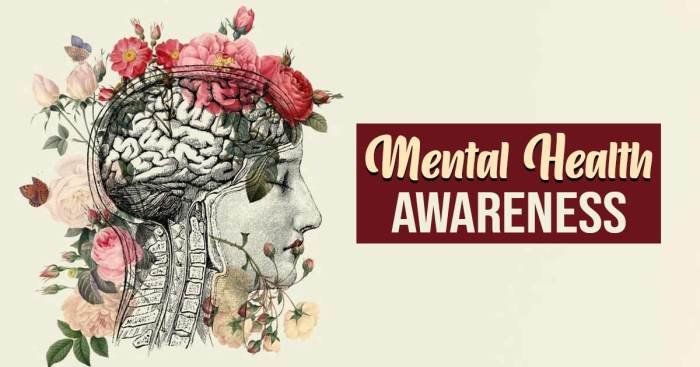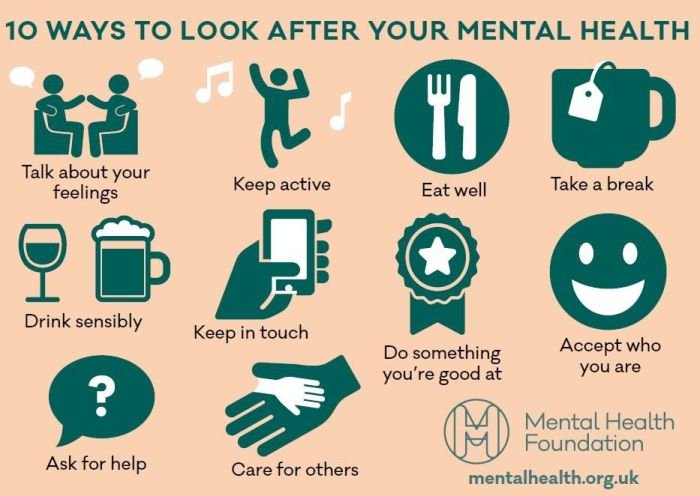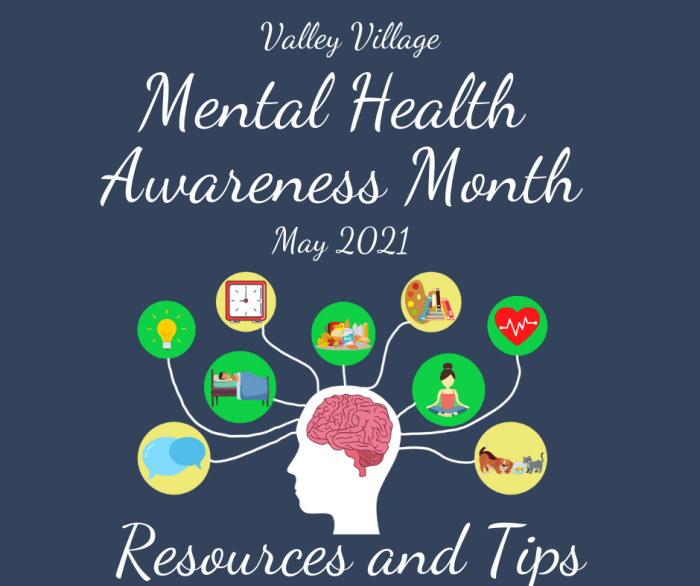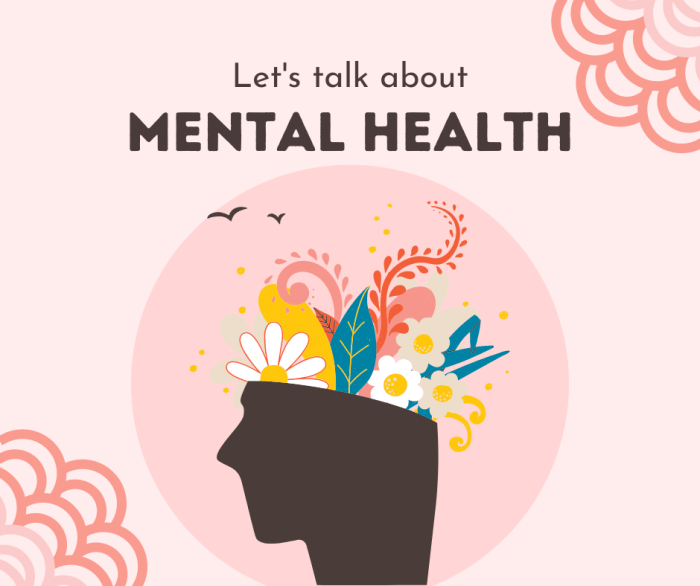Mental health awareness is more than just a buzzword; it’s a vital conversation that impacts every aspect of our lives. This guide delves into the importance of understanding and addressing mental health challenges, exploring strategies for promoting well-being, and highlighting resources available to those in need.
Mental health awareness is crucial because it helps break down stigma, encourages open dialogue, and provides individuals with the tools they need to navigate their mental health journey. By fostering a culture of understanding and support, we can create a world where mental health is prioritized and individuals feel empowered to seek help when they need it.
Understanding Mental Health Awareness
Mental health awareness is crucial in today’s society because it promotes understanding, reduces stigma, and encourages help-seeking behaviors. By raising awareness, we can create a more supportive environment for individuals facing mental health challenges.
The Impact of Stigma and Discrimination
Stigma and discrimination can significantly hinder individuals from seeking mental health support. The fear of judgment, social isolation, and negative consequences often prevents people from disclosing their struggles. This can lead to delayed treatment, worsening symptoms, and increased suffering.
- Stigma can manifest in various forms, including negative stereotypes, prejudice, and discrimination.
- Individuals may face social exclusion, job discrimination, or even family rejection.
- Stigma can create a sense of shame and guilt, making it difficult for people to seek help.
Statistics and Facts about Common Mental Health Conditions
Mental health conditions are common and affect people from all walks of life. Understanding the prevalence and impact of these conditions is essential for promoting awareness and encouraging early intervention.
- According to the World Health Organization (WHO), approximately one in four people will experience a mental health condition at some point in their lives.
- Depression is one of the most common mental health conditions, affecting over 264 million people globally.
- Anxiety disorders are also prevalent, affecting around 284 million people worldwide.
“Mental health is just as important as physical health, and we need to treat it with the same level of care and attention.”
Importance of Open Dialogue and Communication

Open dialogue and communication are crucial for breaking down barriers related to mental health. When we create a space where people feel comfortable talking about their mental well-being, we foster understanding, empathy, and support.
The Power of Open Communication
Open communication can help dismantle the stigma surrounding mental health. It allows individuals to share their experiences, challenges, and feelings without fear of judgment or discrimination. When people feel heard and understood, they are more likely to seek help and support.
- Sharing personal experiences:Sharing personal stories about mental health challenges can help normalize these experiences and show others that they are not alone. For example, a person who has struggled with anxiety might share their experience with a friend or family member, helping them understand the challenges of anxiety and how to provide support.
- Reducing stigma:Open communication can help break down stereotypes and misconceptions about mental health. By discussing mental health openly, we can challenge negative perceptions and create a more supportive environment for those struggling.
- Building connections:When people feel comfortable talking about their mental health, it can foster stronger connections and build a sense of community. This can be especially helpful for individuals who are feeling isolated or alone.
Education and Awareness Campaigns
Education and awareness campaigns play a vital role in promoting understanding of mental health. By providing accurate information and raising awareness about mental health conditions, these campaigns can help dispel myths and misconceptions.
- Increasing knowledge:Educational initiatives can help people understand the signs and symptoms of different mental health conditions, as well as the available resources and treatments. This knowledge can empower individuals to seek help for themselves or support loved ones.
- Promoting empathy and compassion:Awareness campaigns can help people develop empathy and compassion for those struggling with mental health. By sharing stories and experiences, these campaigns can humanize mental health and encourage a more understanding approach.
- Reducing discrimination:By educating the public about mental health, we can reduce discrimination and prejudice against individuals with mental health conditions. This can create a more inclusive and supportive environment for all.
A Hypothetical Scenario
Imagine a young person struggling with depression. They are feeling isolated and hopeless, and they are afraid to reach out for help. However, they have a close friend who has been educated about mental health and understands the importance of open communication.
The friend notices changes in their behavior and encourages them to talk about what they are going through. The young person initially hesitates, but their friend assures them that they are not alone and that there is help available. This open dialogue allows the young person to express their feelings and seek support from their friend and other resources.
The friend encourages them to seek professional help, and they are able to access the treatment they need. This scenario illustrates how open communication can empower individuals to seek help and support, leading to a more positive outcome for their mental health.
Strategies for Promoting Mental Health Awareness

Raising awareness about mental health issues is crucial for creating a more supportive and understanding society. By fostering open dialogue and reducing stigma, we can encourage individuals to seek help and prioritize their well-being.
Effective Methods for Raising Awareness
Effective methods for raising awareness about mental health issues can be categorized into several key areas:
- Education and Training:Implementing mental health education programs in schools, workplaces, and communities can equip individuals with the knowledge and skills to recognize mental health conditions, understand their impact, and promote positive mental health practices.
- Public Campaigns and Media Outreach:Launching public awareness campaigns through various media channels, such as television, radio, social media, and print, can effectively disseminate information about mental health issues, dispel myths, and promote positive mental health messages.
- Community Events and Workshops:Organizing community events, workshops, and seminars focused on mental health can provide opportunities for individuals to learn about mental health issues, access resources, and connect with others who have similar experiences.
- Celebrity Advocacy and Role Models:Enlisting the support of celebrities and influential figures to advocate for mental health awareness can help to break down stigma and encourage open dialogue about mental health issues.
Examples of Successful Campaigns and Initiatives
Numerous successful campaigns and initiatives have contributed significantly to promoting mental health awareness and well-being.
- The “You Are Not Alone” Campaign:Launched by the National Alliance on Mental Illness (NAMI), this campaign aims to reduce stigma and promote help-seeking behavior by sharing personal stories of individuals living with mental illness.
- The “Bell Let’s Talk” Campaign:This Canadian initiative, spearheaded by Bell Canada, raises awareness about mental health issues and encourages open dialogue through various activities, including social media campaigns and donations to mental health organizations.
- The “Time to Change” Campaign:This UK-based campaign focuses on reducing mental health stigma and discrimination in the workplace, encouraging employers to create supportive environments for employees experiencing mental health challenges.
Resources and Support Organizations, Mental health awa
Individuals seeking help for mental health issues can access a wide range of resources and support organizations:
- National Alliance on Mental Illness (NAMI):NAMI provides support, education, advocacy, and public awareness programs for individuals with mental illness and their families.
- Mental Health America (MHA):MHA offers mental health resources, information, and support services to individuals, families, and communities.
- American Foundation for Suicide Prevention (AFSP):AFSP works to prevent suicide through research, education, advocacy, and support programs.
- The National Institute of Mental Health (NIMH):NIMH conducts research on mental health disorders and provides information and resources to the public.
Personal Well-being and Self-Care

Taking care of your mental health is crucial for overall well-being. Self-care practices are essential for managing stress, enhancing mood, and fostering resilience.
Mental health awareness is crucial for overall well-being. It’s important to find healthy outlets for stress and anxiety, and physical activity is a great option. If you’re looking for a fitness center near you, check out fitness connection close to me to find a location convenient for you.
Regular exercise can have a positive impact on your mental health, helping you feel more energized and focused.
Importance of Self-Care Practices
Self-care practices are essential for maintaining mental health. They provide a buffer against stress, promote emotional regulation, and enhance overall well-being. Engaging in self-care activities allows you to prioritize your needs and create a balance in your life. By taking time for yourself, you can replenish your energy, reduce feelings of overwhelm, and cultivate a sense of self-compassion.
Mental health awareness is crucial, and a healthy lifestyle plays a significant role. Physical activity can be a powerful tool in managing stress and improving mood, and the delta fitness authority provides valuable resources and information on various fitness programs.
By prioritizing both physical and mental well-being, we can create a more balanced and fulfilling life.
Self-Care Activities for Promoting Well-being
A variety of self-care activities can promote mental health. Here are some examples:
- Physical Activity:Engaging in regular physical activity, such as walking, running, or swimming, can release endorphins, reduce stress, and improve mood.
- Mindful Meditation:Practicing mindfulness techniques, such as meditation or deep breathing exercises, can help you become more aware of your thoughts and feelings, promoting relaxation and reducing stress.
- Spending Time in Nature:Immersing yourself in nature, such as taking a walk in a park or spending time by the beach, can reduce stress and improve mood.
- Connecting with Loved Ones:Spending time with loved ones, whether it’s through social gatherings, phone calls, or video chats, can provide support and a sense of belonging.
- Creative Pursuits:Engaging in creative activities, such as painting, writing, or playing music, can provide an outlet for expression and relaxation.
- Getting Enough Sleep:Aim for 7-9 hours of quality sleep each night. Adequate sleep is essential for physical and mental health.
- Healthy Eating:Consuming a balanced diet rich in fruits, vegetables, and whole grains can provide essential nutrients for brain function and overall well-being.
- Setting Boundaries:Learning to set boundaries in your personal and professional life can help you manage stress and protect your mental health.
- Seeking Professional Help:If you are struggling with your mental health, don’t hesitate to seek professional help from a therapist or counselor.
Mindfulness and Stress Management Techniques
Mindfulness and stress management techniques are crucial for promoting mental well-being. Mindfulness involves paying attention to the present moment without judgment, while stress management techniques help you cope with challenging situations.
“Mindfulness is the practice of paying attention to the present moment without judgment. It involves becoming aware of your thoughts, feelings, and sensations without getting caught up in them.”
Jon Kabat-Zinn
Some effective stress management techniques include:
- Deep Breathing Exercises:Deep breathing exercises can help calm your nervous system and reduce stress.
- Progressive Muscle Relaxation:This technique involves tensing and relaxing different muscle groups to relieve tension.
- Yoga and Tai Chi:These practices combine physical movement with mindfulness, promoting relaxation and stress reduction.
- Journaling:Writing down your thoughts and feelings can help you process emotions and gain a better understanding of yourself.
Mental Health Resources and Support Systems
It can be challenging to navigate mental health challenges alone. Fortunately, there are numerous resources and support systems available to help individuals access the support they need. This section explores some of the most valuable resources and emphasizes the importance of seeking professional help and connecting with others.
Mental Health Resources
A wide range of mental health resources can provide valuable information, support, and guidance. These resources can be accessed through various channels, including hotlines, websites, and mobile applications.
Mental Health Hotlines
- The National Suicide Prevention Lifeline:988 – Provides 24/7 confidential support for individuals in suicidal crisis or emotional distress.
- Crisis Text Line:Text HOME to 741741 – Offers free, confidential support via text message for individuals facing mental health challenges.
- The Trevor Project:1-866-488-7386 – Provides crisis intervention and suicide prevention services for LGBTQ youth.
Mental Health Websites
- National Alliance on Mental Illness (NAMI): https://www.nami.org/ – Offers information, support, and advocacy for individuals with mental illness and their families.
- MentalHealth.gov: https://www.mentalhealth.gov/ – Provides comprehensive information on mental health conditions, treatment options, and resources.
- American Psychological Association (APA): https://www.apa.org/ – Offers resources for mental health professionals and the public, including information on mental health conditions and treatments.
Mental Health Apps
- Headspace:Provides guided meditations, mindfulness exercises, and sleep tools to improve mental well-being.
- Calm:Offers a variety of mindfulness practices, including guided meditations, sleep stories, and nature sounds.
- BetterHelp:Provides online therapy sessions with licensed therapists, offering convenient and affordable access to mental health care.
Benefits of Seeking Professional Help
Seeking professional help from therapists or counselors can significantly benefit individuals facing mental health challenges.
Expert Guidance and Support
- Personalized Treatment Plans:Therapists can develop individualized treatment plans tailored to each person’s unique needs and goals.
- Evidence-Based Therapies:Therapists use evidence-based therapies proven effective in treating various mental health conditions.
- Objective Perspective:Therapists provide an objective perspective on challenges, helping individuals gain clarity and insights.
Improved Mental Health Outcomes
- Reduced Symptoms:Therapy can effectively reduce symptoms of mental health conditions, improving overall well-being.
- Enhanced Coping Skills:Therapists teach coping mechanisms to manage stress, anxiety, and other challenges.
- Increased Self-Awareness:Therapy promotes self-reflection and understanding, leading to increased self-awareness and personal growth.
Importance of Support Groups and Peer-to-Peer Connections
Connecting with others who understand mental health challenges can provide invaluable support and encouragement.
Shared Experiences and Understanding
- Sense of Belonging:Support groups create a safe and supportive environment where individuals can connect with others who share similar experiences.
- Reduced Stigma:Sharing experiences with others can help reduce the stigma associated with mental illness.
- Practical Advice and Support:Members can offer practical advice and emotional support based on their own experiences.
Increased Resilience and Empowerment
- Coping Strategies:Support groups can provide valuable insights into coping strategies and resources.
- Motivation and Inspiration:Hearing others’ stories of resilience and recovery can be incredibly motivating and inspiring.
- Empowerment and Advocacy:Support groups can empower individuals to advocate for their needs and rights.
Mental Health in the Workplace

Mental health is a crucial aspect of overall well-being, and its impact extends beyond individual lives to influence the workplace environment. A mentally healthy workforce is more productive, engaged, and innovative, contributing to a positive and thriving organizational culture.
Impact on Workplace Productivity and Employee Well-being
A healthy mental state directly affects an individual’s ability to perform effectively in the workplace. Employees struggling with mental health issues may experience reduced concentration, difficulty making decisions, and decreased motivation. This can lead to decreased productivity, increased errors, and absenteeism.
Furthermore, a negative work environment characterized by high stress, lack of support, and unhealthy work-life balance can exacerbate mental health challenges. Employees may experience burnout, anxiety, and depression, impacting their overall well-being and job satisfaction.
Examples of Companies Prioritizing Mental Health Support
Several companies have recognized the importance of mental health in the workplace and have implemented initiatives to support their employees’ well-being.
- Adobe:Offers a comprehensive mental health program that includes access to mental health professionals, employee resource groups, and mental health awareness training.
- Google:Provides mental health resources through its “Be Well” program, which includes access to therapists, support groups, and mindfulness workshops.
- LinkedIn:Offers a mental health platform called “InWell,” which provides resources and support for employees struggling with mental health issues.
Strategies for Creating a Mentally Healthy Work Environment
Creating a mentally healthy work environment involves implementing strategies that promote employee well-being and address potential mental health challenges.
Mental health awareness is crucial for overall well-being, and it’s important to find healthy ways to manage stress and promote self-care. Engaging in activities that bring joy and relaxation can be incredibly beneficial, and some people find solace in fitness practices like beauty barre.
This low-impact workout combines elements of ballet, Pilates, and yoga, promoting strength, flexibility, and mindfulness, all of which contribute to a positive mental state.
- Promote Open Dialogue and Communication:Encourage open communication about mental health and create a safe space for employees to discuss their concerns without fear of stigma or judgment.
- Offer Flexible Work Arrangements:Implement flexible work arrangements, such as remote work options or flexible hours, to reduce stress and improve work-life balance.
- Provide Mental Health Resources:Make mental health resources readily available, including access to therapists, employee assistance programs, and mental health awareness training.
- Foster a Positive and Supportive Work Culture:Create a positive and supportive work environment by promoting teamwork, collaboration, and mutual respect. This can help reduce stress and improve morale.
- Encourage Self-Care:Encourage employees to prioritize their well-being by taking breaks, engaging in physical activity, and practicing mindfulness techniques.
Mental Health and Social Media

Social media has become an integral part of modern life, offering a platform for connection, information sharing, and entertainment. While it can be a valuable tool for fostering relationships and accessing support, social media can also have a significant impact on mental health, both positively and negatively.
The Impact of Social Media on Mental Health
Social media can have both positive and negative effects on mental health.
- Positive Effects:Social media can connect individuals with others who share similar interests or experiences, fostering a sense of belonging and reducing feelings of isolation. It can also provide access to information and resources related to mental health, promoting awareness and destigmatization.
- Negative Effects:Social media can contribute to feelings of inadequacy, anxiety, and depression. This can be due to the constant comparison with others’ seemingly perfect lives, the pressure to present a curated image of oneself, and the potential for cyberbullying and harassment.
The impact of social media on mental health can vary greatly depending on individual factors such as age, personality, and the type of content consumed.
The Role of Social Media in Promoting Mental Health Awareness
Social media platforms can play a crucial role in promoting mental health awareness and reducing stigma.
- Increased Visibility:Social media provides a platform for individuals to share their personal experiences with mental health, helping to normalize conversations and increase understanding.
- Access to Information:Social media platforms can connect individuals with mental health resources, organizations, and support groups. This can be particularly helpful for those who may feel hesitant to seek help in person.
- Campaigning and Advocacy:Social media can be used to raise awareness about specific mental health issues, promote campaigns, and advocate for policy changes.
While social media can be a powerful tool for promoting mental health awareness, it is essential to be critical of the information shared and to avoid spreading misinformation.
A Guide for Responsible Social Media Use
Responsible social media use is crucial for promoting well-being.
- Be Mindful of Your Time:Limit the amount of time you spend on social media and set boundaries to avoid excessive use.
- Curate Your Feed:Follow accounts that promote positive messages and mental health awareness, and unfollow those that trigger negative emotions.
- Be Authentic:Avoid comparing yourself to others and focus on presenting your authentic self, rather than an idealized version.
- Disconnect Regularly:Take breaks from social media to engage in activities that promote well-being, such as spending time in nature, exercising, or connecting with loved ones.
- Be Mindful of Your Online Interactions:Engage in respectful and constructive conversations, and avoid cyberbullying or harassment.
- Seek Professional Help:If you are struggling with your mental health, reach out to a mental health professional for support.
Social media can be a valuable tool for promoting mental health awareness and connecting with others, but it is essential to use it responsibly and prioritize your well-being.
Conclusion

As we navigate the complexities of modern life, prioritizing mental health awareness becomes increasingly essential. By embracing open communication, seeking support when needed, and promoting self-care practices, we can cultivate a society where mental well-being is valued and accessible to all.
Remember, you are not alone, and there are resources available to help you on your journey to mental health.
FAQ Insights
What are some common mental health conditions?
Common mental health conditions include anxiety, depression, bipolar disorder, obsessive-compulsive disorder (OCD), post-traumatic stress disorder (PTSD), and schizophrenia, among others.
How can I help someone struggling with mental health?
Offer your support, listen without judgment, encourage them to seek professional help, and provide information about available resources. Remember, you can’t force someone to seek help, but you can be there for them.
What are some self-care practices that can help improve mental health?
Self-care practices include exercise, mindfulness, meditation, spending time in nature, engaging in hobbies, and prioritizing sleep. It’s important to find what works best for you and make it a regular part of your routine.